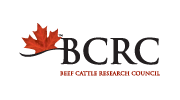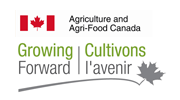Defining the Environmental Hoofprint of Canadian Beef Production
| Project Code: | ENV.02.13 |
| Completed: | In Progress. Results expected in March 2018. |
Project Title:
Defining the Environmental Footprint of Canadian Beef Production
Researchers:
Tim McAllister, Ph.D. and Karen Beauchemin, Ph.D. tim.mcallister@agr.gc.ca
Getahun Legesse, Ph.D. and Kim Ominski, Ph.D. (University of Manitoba) and Roland Kroebel, Henry Janzen, Anne Smith, Sean McGinn and Frank Larney, Ph.D. (Agriculture and Agri-Food Canada)
Background Beef is often portrayed as environmentally unfriendly due to concerns about greenhouse gases produced by the rumen and manure, the amount of manure produced in feedlots, and the amount of water, feed and fossil fuels consumed in the production, processing and transport of cattle and beef. However, cattle also make positive contributions to the environment through their ability to convert low-quality forages into high-quality protein for humans, as well as grassland’s contributions to carbon sequestration, maintenance of watersheds, wetlands, and habitat to support plant, animal, bird and insect biodiversity.
Changes in beef production practices have enabled Canada to become a major player in the global beef industry. Canada is the world’s 11th largest beef producer, but is the world’s 5th largest beef exporter, and the world’s 3rd largest exporter of high quality beef. The improvements in production efficiencies that have allowed Canada to become internationally competitive have also had environmental benefits. Management practices that improve animal growth rates and feed efficiency also increase the amount of beef that can be produced per acre, reduce the amount of feed required to raise cattle, reduce days to slaughter, and reduce manure and greenhouse gas production. Similarly, management practices that improve forage productivity have benefits for soil health and encourage beef producers to keep land in pasture and hay crops (with their associated environmental benefits) rather than converting them to annual crops.
The beef industry’s potential environmental impacts (both negative and positive) are understood in a general sense as many individual impacts have been studied in research projects over the years. However, the available data has never been pulled together into a reliable summary of what the environmental hoofprint of Canada’s beef industry actually is, or how it has changed over the years. Canadian researchers can provide a broader and more balanced perspective to this issue.
${pageBreak}
Objectives To gather and assimilate information to describe how the environmental impact of Canada’s beef industry has changed over the past thirty years.
What they will do This research will bring together data collected by Canadian researchers under Canadian conditions, and use it to model how changes in industry practices have impacted the Canadian beef industry’s environmental impact since 1980. They will examine how the amount (and types) of feed, land and water needed to produce a kilogram of beef, the amount of greenhouse gas and manure produced per kilogram of beef, as well as changes in water quality, carbon sequestration, biodiversity and other ecosystems services have changed.
This project will measure the improvements the Canadian beef industry has made to its environmental hoofprint as well as highlighting opportunities for further improvement.
Implications This information will provide the beef industry with balanced, factual information to justify the environmental attributes of the Canadian Beef Advantage, assess the environmental goods and services provided by Canada’s beef industry, and identify ways in which different sectors of the beef industry can improve their environmental performance.
The historical assessment (1980 to present) done in this project will enrich the Canadian Roundtable for Sustainable Beef’s (CRSB) Economic, Social and Environmental Sustainability Assessment by contributing historical context. The CRSB Sustainability Assessment will establish a long term monitoring framework to evaluate the Canadian beef industry’s sustainability performance on an ongoing basis. Together the two studies will help build a comprehensive understanding of the industry’s past, present and future environmental hoofprint.
Results of the first phase of this study, which evaluated greenhouse gas (GHG) emmisons and resource use, are available here: http://www.beefresearch.ca/factsheet.cfm/producing-beef-with-less-ghg-emissions-and-using-fewer-resources-225








